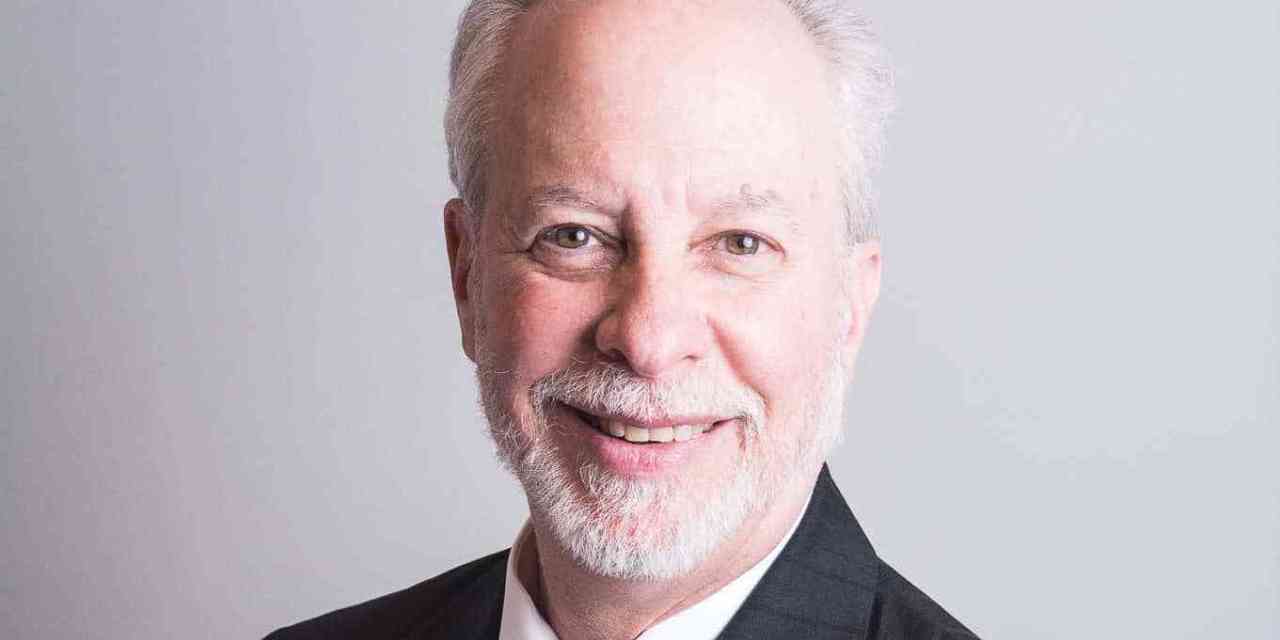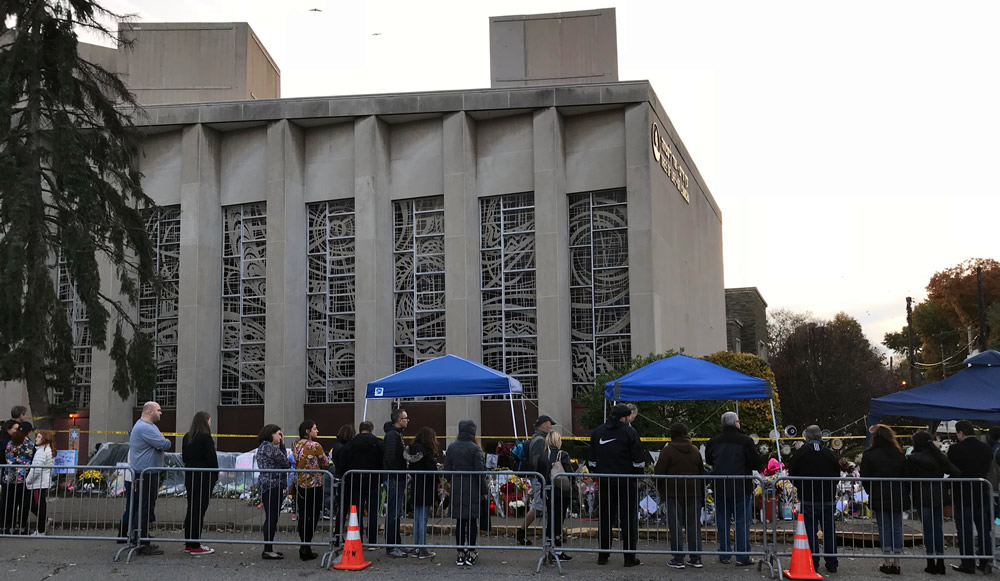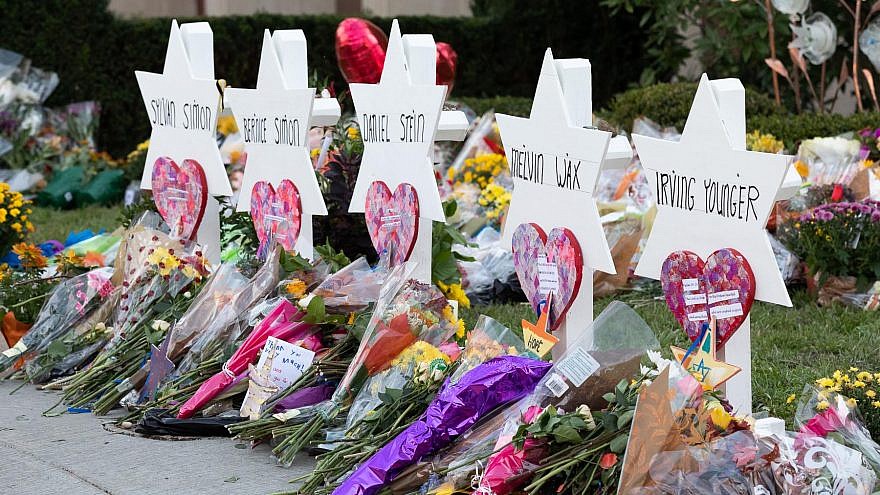It has been a deadly week in America with the back-to-back shootings in El Paso, Texas, and Dayton, Ohio, which left a combined total of 31 people dead. For the Jewish community, it dredged up feelings of insecurity as they still grapple with two deadly shootings at synagogues: one on the East Coast and one on the West.
Lone gunmen entered the Tree of Life*Or L’Simcha Synagogue in Pittsburgh and Chabad of Poway, Calif., exactly six months apart to the day. And it has changed the way Jewish Americans view their safety, especially as the High Holidays approach and synagogues across the country will reach maximum capacity.
“The former normal no longer exists,” Rabbi Hazzan Jeffrey Myers of Tree of Life told JNS. “We are learning what the new normal is and how to work with it.”

The shooting on Oct. 27, 2018 during Shabbat morning services in the Squirrel Hill neighborhood of Pittsburgh caused the deaths of 11 Jewish worshippers and injured six. The perpetrator, 46-year-old Robert Gregory Bowers, was arrested and charged with 63 federal crimes and 36 state charges.
Myers said the Pittsburgh Jewish community as a whole is still coping with the aftermath of the attack, saying, “We continue to promote healing and have come to learn that healing will be a lifelong process. No two people are at the same place at the same time.”
He added that many community and synagogue members are “still shaken,” and regrettably, there are people who are unable to return to any synagogue to pray.
Barb Feige, executive director of the Tree of Life*Or L’Simcha congregation, told JNS that the coping process needs time, saying that it “varies from person to person. No one grieves on the same schedule.”
“We are all helping each other heal. Healing is a process, not a ‘one and done.’ We continue to support and uplift each other in any way we can,” she continued. “The greater Jewish community and the greater Pittsburgh community have been so wonderfully supportive. Love and prayers have come from all over the country, and indeed, all over the world. It means so much to know that so many people care. And yet, there is a before and after—we are still working to adjust to the after and what it means for us as Jews, as Pittsburghers and as a community.”
Alex Hertzman of the Jewish Federation of Greater Pittsburgh was a former member of the Or L’Simcha congregation and knew some of the victims of the attack from the neighborhood and the local Jewish Community Center, including brothers Cecil, 59, and David Rosenthal, 54.
He told JNS that the community has “very much come together and banded together” to support those in need of help, and that some five or six months after the attack, a number of people have come forward with mental-health problems, such as post-traumatic stress disorder. He said a lot more attention is being paid now to security in the Pittsburgh Jewish community, and even though the city had already made many improvements to security before the attack, they have taken even more measures following the massacre.
Congregants of Tree of Life*Or L’Simcha have not yet returned to the building where the shooting took place (it remains closed), but the temple continues to hold daily prayer services, programs and events.
Feige said, “A congregation—a community—is not defined by geography or real estate or physical plant, but by people coming together. We look forward to returning to our own space eventually; for now, we are here, and there is much to do.”

‘Reach out to people unfamiliar with Judaism’
Pittsburgh was followed by the shooting at Chabad of Poway outside San Diego on April 27, the last day of Passover.
John Earnest, 19, a nursing student who had no prior criminal record, entered the synagogue lobby during Shabbat-morning services and proceeded to riddle it with bullets from an automatic weapon, killing 60-year-old Lori Gilbert-Kaye and injuring three people, including senior Rabbi Yisroel Goldstein, who lost one finger and injured another in the attack.
Goldstein has since been received at the White House and addressed the United Nations, urging both citizens and leaders to take note of growing anti-Semitism, as well as to encourage Jews to stand strong and remain proud of their identity.
In a Newsweek op-ed last week, Kaye’s husband, Dr. Howard Kaye, opened up about the shooting and said, “In trying to understand the root cause of the atrocity that took Lori’s life and, even more urgently, in seeking to prevent the next Poway from occurring, it became clear to me that Lori’s killer was motivated by anti-Semitic hatred. His was a convoluted and reprehensible mindset that perverted his morality and convinced him that some people were worthy of life—and others were not.”
He added that to stop the next shooter, the world needs to be educated about “its inherent moral compass.”
As Kaye explained, “each time a murderous, twisted individual commits a crime of hate, the urgency to educate society about the basic laws of human civilization grows. It holds the potential to stop the next atrocity. Every human being innately possesses the moral compass to rise above the reprehensible behavior that ended her life. It is our obligation to nurture and educate toward that morality, and to fill this world with goodness and kindness.”
Hertzman said the lesson to take away from these attacks is the need to do more to educate people about Judaism and to combat anti-Semitism in America through education. He told JNS that “there are lots of avenues to reach out to people who might be fearful of things they don’t know or unfamiliar with Judaism and the Jewish faith, and there are opportunities for more education.”
“This is a marathon, not a sprint,” he said. “I sincerely believe education, outreach and efforts to expose and educate against anti-Semitism are all effective methods to preventing attacks in the future.”
Myers talked about another takeaway from the Pittsburgh attack, saying, “We have learned that despite as welcome and safe the Jewish community has felt in the United States, there are a group of Americans who continue to treat the Jewish community as ‘other’ and unwelcome. We continue to work to find commonalities with our fellow citizens to promote an America that is welcoming to all.”


























